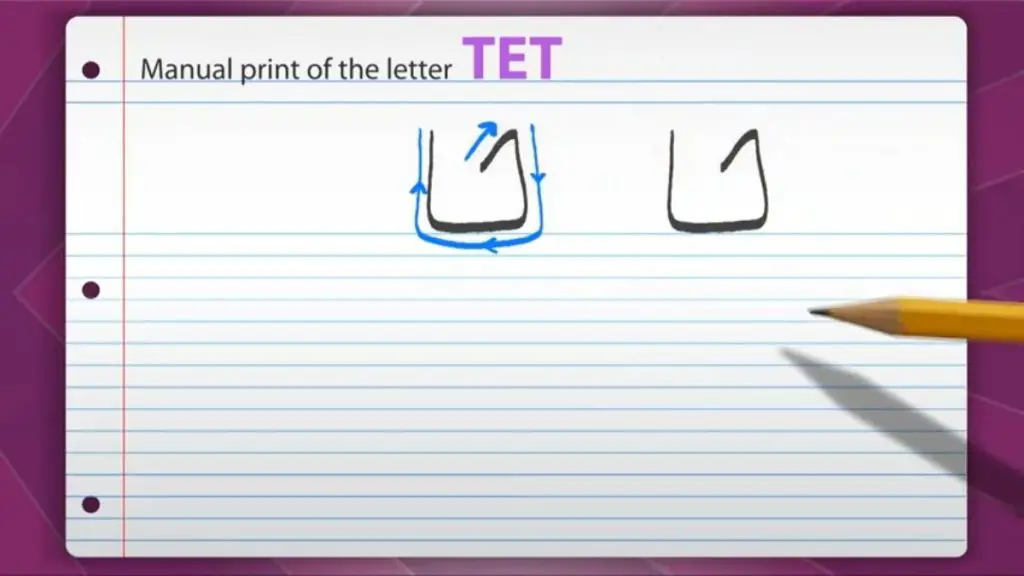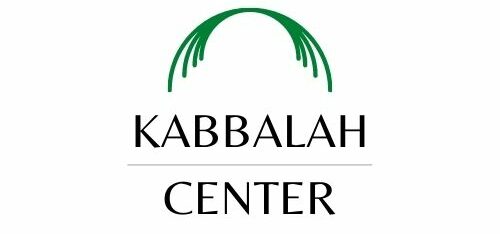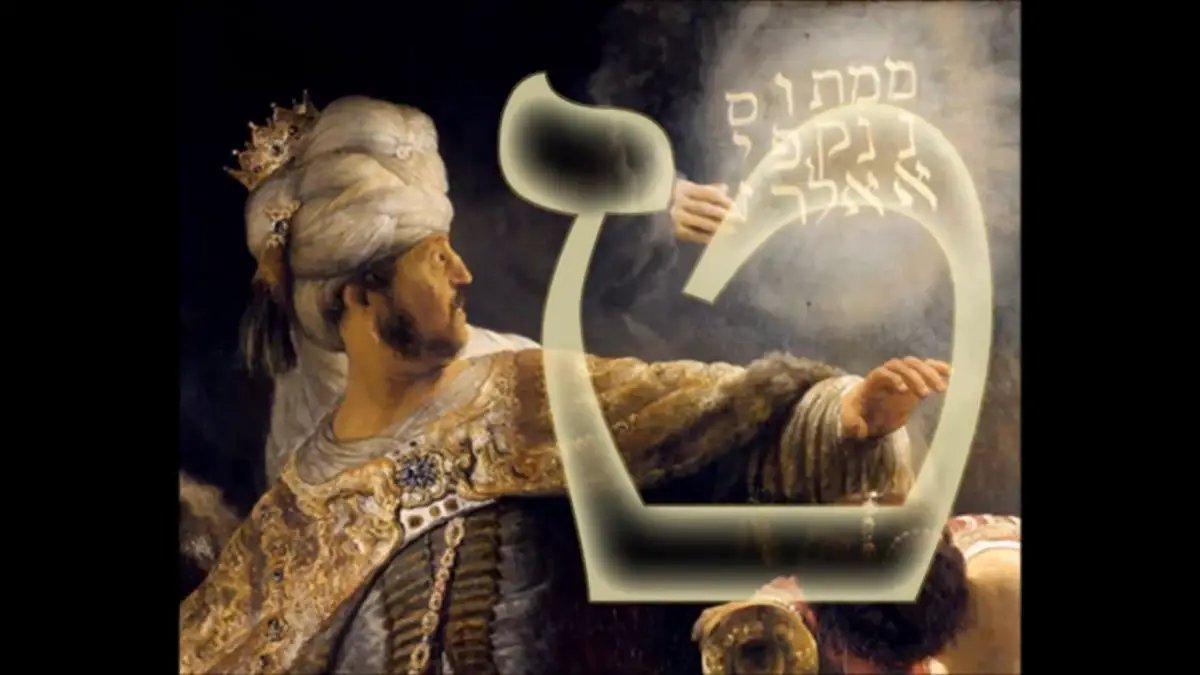Hebrew letter tet meaning
The Hebrew letter Tet is shaped like a vessel that contains something good and hides it within. The first time the Hebrew letter Tet appears in the book of Genesis is in the word tov, “good,” and hints to the highest form of divine love.
Meditation on the letter Tet helps us to focus our attention on the good that surrounds us. This tov is synonymous with the life force that animates all of creation. If we are meant to emanate God’s attributes, we are then obligated to look for the good in ourselves and in others.
It is through this letter that we understand that God knows what benefits us and if we look through the surface of “good” and “evil” we may perceive His consistent, unbending love for us.
Hebrew letter tet Symbolism
When we read that God “saw it was tov (‘good’)” following each day of creation, we might ask what was this goodness that God saw. Everything that was created was perfectly designed to fulfill its purpose. For example, each animal has the physical characteristics and abilities to sustain itself in a particular environment, to reproduce and defend itself. Everything that God created appeared so perfect so that on the seventh day God ceased from all the work that he had been creating and stood afar, like an artist, and declared: “it is good.”
Did God need reassurance that His creation was good? Or, as in the case of his “resting” on Shabbat, was He trying to teach us to always see the “good”?
Hebrew letter tet significance
The letter Tet refers to the idea of noticing hidden blessings even in unpleasant events. As hard as it is to always maintain an optimistic perspective, we must accept any given situation, especially those that are difficult, with the belief that their hidden good is beyond our understanding. We have just a limited frame of reference, but there is a whole picture beyond our personal perception. It is within the whole picture (that sometimes includes previous reincarnations) that the particular situation makes sense and indicates God’s goodness and love for us.
Joseph is one of the Biblical protagonists whose life exemplifies the way God’s plan plays out in ways beyond our understanding. The horrific act of Joseph’s brothers, initially intending to kill him, and ending up selling him to Arab traders en route to Egypt, ultimately led to his becoming the vice-king of Egypt. In this exalted position he was able to feed his family during the famine. When Joseph reveals his identity to his brothers he says, “…it is not you who sent me here, but God.”
King David’s beautiful Psalms have been universally recited by countless generations because of the solace it provides at a time of need. Psalm 23 especially expresses the ultimate statement of trust. It begins with “The Lord Is my shepherd, I shall not lack…” an expression of the optimism and faith with which we should greet life’s experiences. His words continue to guide us until our last moments: “Even though I walk through the valley of the shadow of death, I will fear no evil…for goodness and mercy shall follow me…”
Jewish history reveals the importance of always getting in touch with the hidden goodness. We see this especially on Tet of Av (Tish b’Av, the Ninth Day of the Month of Av) one of the most sacred days in the Jewish calendar. This was the day on which both Temples in Jerusalem were destroyed, the first in 420 B.C.E. and the second in 70 C.E. The expulsion of the Jews from Spain in 1492 C.E. and other tragedies of the Jewish people also took place on the same day, Tet of Av.
The first Tisha b’Av occurred as a result of the testimony of the spies who were sent by Moses to report about the land of Canaan, which God was giving them as an inheritance. The bad report in their famous expression “it is a land that swallows its inhabitants” expressed such a lack of trust in God that the 9th of Av became a day of mourning. Because the Jews could not see the good, but only the hardships that they would face in Israel, in the future we have good reasons to weep, especially on that day.
How can we then explain the apparent contradiction between these two messages of the letter Tet? One possibility might be that during the events that took place on the Ninth of Av, Jews were called on to show God their ability to accept and grow through suffering. The expulsion of Spain caused the Jews to push and finance the discovery of America, the land that would become the new homeland for many persecuted people
The Oral Tradition invites us to accept with joy, or at least with a feeling of mature acceptance, the trials and challenges we experience. We can only sincerely react in this way when we understand that this world is a “school of life,” covering every sphere of experience.
Its classrooms are relationships, work, illness and suffering. The diploma we receive is our psychological and spiritual maturity. When a Jew hears about the death of someone, he should pronounce the following blessing: Baruch dayan ha’emet—“Blessed is the truthful Judge.” With this he plants in his subconscious that even if he will mourn for weeks and months and years, he is ready one day to fully grasp the meaning of the ultimate truth of Divine Judgment.
The Book of Zohar states that at the entrance to the celestial academy of Rabbi Shimon bar Yochai, a voice proclaims: “Entrance is forbidden to those who in their lifetimes were not able to transform darkness into light and bitter into sweet.” Being aware that all experiences, positive or negative, are meant for our evolution, effects this transformation. The wise of all religions and all ages have also taught this truth to be the secret for enlightenment.
Hebrew letter tet in the bible
As we have seen, one of the names of God is Elokim, which has the same numerical value as the word ha’teva (“nature”). Mystics of all ages have searched for the Shechinah, the feminine aspect of God, in nature. In the Holy City of Safed, the famous Kabbalists of the 16th and 17th centuries started the Shabbat prayers by leaving the synagogues and going to the fields to welcome the Shechinah, the divine feminine immanence, personified as the “Shabbat Queen.”
One of the main works of the Talmud is Perek Shirah, totally dedicated to the study and glorification of nature. Perek Shirah, “A Chapter Of Song,” is an ancient text that some commentaries attribute to King David himself. It takes the form of a list of eighty-four elements of the natural world (sky, earth, plants, birds, animals, and insects, etc). Each one is associated with a verse from the Bible.
This text was so highly revered that Rebbe (Yehuda HaNassi) said, “Anyone who engrosses himself in Perek Shirah in this world merits to learn and to teach, and his learning succeeds, and he is delivered from the evil Inclination and from all harm, and from castigation of the grave and from the verdict of Geihenom, and from the birth pangs of Mashiach.” It is taught that Rabbi Eliezer the Great said: “Anyone who engrosses himself in Perek Shirah every day, I bear witness that he is destined for the World-to-Come, and is delivered from calamity, the Satan, and from all types of evil and destruction. And he enjoys longevity of days, and merits life in the World-to-Come.”
The concept behind Perek Shirah is that everything in the natural world teaches us a lesson in ethics or spirituality. The “songs” of the natural world weave a tapestry of lessons for life. Perek Shirah, a work of tremendous historic value, is itself extremely mysterious and cryptic. However, various commentaries have been written over the last five hundred years, giving insight into what creation is teaching us.
I will quote some of its verses:
- The heavens say: “The Heavens tell of God’s glory, and the firmament tells of His handiwork.” (Psalms 19:2)
- The desert says: “The desert and the wasteland shall rejoice, and the arid region shall rejoice and blossom like a rose.” (Isaiah 35:1)
- The fields say: “HaShem founded the land with wisdom; He established the heavens with understanding.” (Proverbs 3:19)
- The seas say: “More than the voices of many waters, mightier than the breakers of the sea, HaShem is mighty on high.” (Psalms) 93:4).
Regarding contemplation of nature, Rambam writes:
When a person meditates on these things and recognizes the creations—forces, constellations…—he will be in awe of the wisdom of the hidden Source in all of its handiworks and all its creations. Pleasurable identification with the Infinite will increase, and one’s soul will expand and will strive to love the Infinite, the Source.”
Rebbe, after having being immersed for a long time in the contemplation of a wild duck, prayed to God that this would help him “acquire Olam HaBa, the World to Come”: Obviously for the great masters of Kabbalah, meditation and contemplation of nature was a means of achieving a clear and direct line of communication with the Infinite. This ultimate state of transcendental awareness is also called “prophecy.”
The average (non-prophetic) person receives indirect but potentially clear communications from the Infinite in the form of daily events that occur. There are some, particularly insane people, who can apparently receive direct but unclear communications. In contrast, the prophetic experience is described as a communication that is both clear and direct.
Deveikut (“cleaving to God”) is a specific method of reaching transcendence. Ultimately, the Infinite’s essence is unknowable by a finite mind with finite senses. Nonetheless, the Infinite created this universe for the purpose of giving to another. We are that other, and the greatest gift is the ability to have a relationship with the Infinite itself.
Everything is the Infinite. The infinite is the “location” of the universe. Indeed, one of the Hebrew terms for the Infinite is ha’makom—the place. On human terms, however, it suffices to understand that the Infinite by definition is always very near to us. This understanding is not intellectually difficult but does require practice in order to be integrated into a constant awareness.
Fasting is a practice of constant focus and awareness that is central to Zen Buddhism. Westerners developed a limited version of this awareness called “epiphany”: the momentary experience of an object’s infinite source. Judaism combines the two by cultivating both an expanded mind and a constant awareness of this world.
Perek Shirah found some hints in the verses of the Bible, to the connection of Nature to its transcendent source. Here are a few more quotes.
The rivers say: “Let the rivers clap their hands, together the mountains shall sing for joy!” (Psalms 98:8)
The wellsprings say: “And as singers that are flutists, are all my wellsprings within you.” (Psalms 87:7)
The day says: “The day to day utters speech and night to night expresses knowledge.” (Psalms 19:3)
The rain-clouds say: “He made darkness His secret place; His surroundings are His shelter, the darkness of water the clouds of the heavens.” (Psalms 18:12)
The hen says: “He gives bread to all flesh, for His loving-kindness endures forever.” (Psalms 136:25)
The dove says before The Holy One, Blessed Be He, “Master of the World, may my sustenance be as bitter as an olive in Your hands, rather than being sweet as honey in the hands of flesh and blood.” (Talmud, Masechet Eruvin 18b)
The crane says: “Give thanks to Hashem with the lyre; play for Him with the ten-stringed harp.” (Psalms 33:2)
The swallow says: “So that my soul shall sing Your honor and shall not be silent, Hashem my God—I shall forever thank you.” (Psalms 30:13)
The swift says: “My help is from Hashem, Maker of Heaven and Earth.” (Psalms 121:2)
The duck says: “Trust in Hashem forever, for God Hashem is the everlasting rock.” (Isaiah 26:4)
The giant sea-creatures say: “Praise Hashem from the earth, the giant sea creatures and the depths.” (Psalms 148:7)
The whale says: “Give thanks to Hashem for He is good, His kindness endures forever.” (Psalms 136:1).
These last verses might sound familiar to anyone who has been involved with the mysterious world of whales. Two thousand years after Perek Shirah, the whales are thanking God for saving their species from sure extinction. This is a great act of love, clearly recognized by all modern nature “contemplators.”
Unfortunately, two thousand years of persecutions and exile have caused most Jews to lose their connection to the feminine aspect of Godliness and to relate more comfortably (and safely, during times of persecutions) to the transcendent aspect of God. Thus, we have for the most part exclusively become the “people of the book,” connecting on a more intellectual with God. This has caused us to lose touch with our Kabbalistic inheritance, our bond with the Shechinah, whose presence is most easily felt in the natural world.
Adam, the first man on earth, in the Garden of Eden was given a special task to love, enjoy and take care of the whole planet. All environmental abuse can be attributed to the disconnection between Adam’s descendents and the Shechinah (“mother earth”), which, according to the words of bio-molecular scientist Bruce Lipton, is “trying to expel, with its fever, the micro-organisms that are disturbing its balance: mankind.” The increasing phenomena of floods, earthquakes, and other natural disasters may be interpreted as the earth’s valiant effort to restore the balance that was disrupted by man’s destructive and unrestrained, greedy pursuits, in the name of progress.
Hebrew letter after tet in crossword
The hebrew letter that comes after tet is Yud.
Hebrew letter tet picture

Conclusion
the letter Tet is a letter of birth and renewal of bringing potential to actualization and a very meaningful meditation would be to focus on all the goodness in the world how much goodness is hidden all around us how form is hidden in matter how the soul is hidden in the body and how God is hidden in the world.


